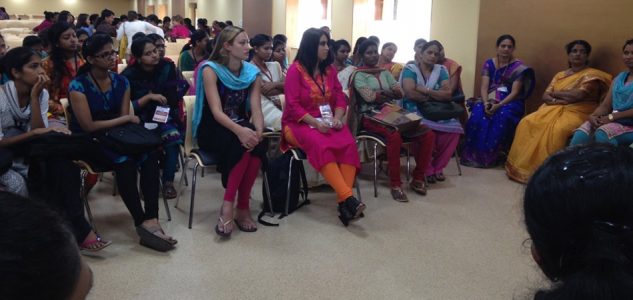Nursing students represent McMaster at Global Health Conference

BY Nandini Nandeesha, Level IV BScN, McMaster University
February 14, 2017
Representing McMaster University, a team of nine students attended the International Women’s and Children’s Health Conference at Manipal University, India. The conference was hosted by Manipal School of Nursing and welcomed over 500 delegates from 19 countries. The event also reached out to members of various disciplines involved in global health including scientists, environmentalists, nurses, physicians, midwives, nutritionists, politicians and social workers.
This year’s theme was the impact of Global Issues on Women and Children. In collaboration with Manipal University nursing students, we were involved in conference planning and facilitation during workshops. In addition, we facilitated group discussions on topics such as HIV/AIDS, globalization and the aging process. A few of us had the opportunity to speak about our own research during poster presentations.
The five days spent at Manipal was truly an educationally enriching experience and we all came back with new perspectives on global health. I was fascinated by variations in the nursing curriculum that existed based on geographical region. For example, Japan has ‘disaster nursing’ included in their nursing curriculum to prepare students for providing care to survivors after events such as earthquakes and typhoons. This knowledge was also used internationally to prepare countries like Bangladesh in the event of a natural disaster.
Furthermore, it was thought-provoking to see how strategies developed in western parts of the world were being used to promote health and wellbeing in the east and in developing countries. For example, CycleBeads is used as part of the Standard Days Method, a fertility awareness-based family planning method. It helps prevent unwanted pregnancies and also allows to optimize on a female’s fertility period. This method was initially developed by researchers at Georgetown University and is now being used by millions of women in countries like Rwanda, India and Egypt.
We also learned about the value of a community approach to nursing. When implementing new initiatives, we learned strategies for knowledge dissemination to rural communities as well as how to mobilize a team of people that can take charge for their own health and the health of their local communities. For example, strategies such as educating women so that they can then educate families, and educating village seniors who can then advocate for the well-being of their entire village.
Coming back home, we hope to encourage students to broaden their horizons and look at issues occurring around the world. Living in a first-world nation, we are far more privileged and as students having the opportunity to attend post-secondary institutions, we have the ability to give back to our global community right here from home. A part of that begins with heightening our awareness to women’s and children’s health needs on a global scale. Furthermore, we hope to bring education to developing parts of the world and equip them with the knowledge on how to use the education for health promotion. Given the profession we’re already in, nurses are at the frontline of healthcare. We are leaders universally and this allows us to connect on a global level. Therefore we hope to learn from each other and adapt effective care strategies that are being used around the world to improve the care we provide to our patients.






